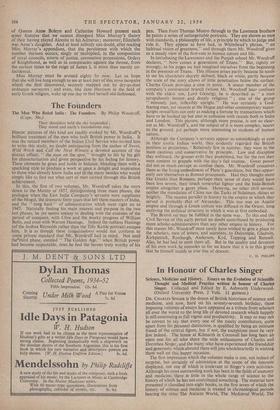The Founders
The Men Who Ruled India : The Founders. By Philip Woodruff. (Cape. 30s.)
Their shoulders held the sky suspended ; They stood and earth's foundations stay.
HEROIC pictures of this kind are readily evoked by Mr. Woodruff's brilliant treatment of the men who built British power in India. It was the retired members of the Indian Civil Service who invited him to write this study, no doubt anticipating from the author of Sweet, Wild Witch and Call the Next Witness a devoted account of the district officer, " the man on the spot," brought to life by his gift for characterisation and given perspective by his feeling for history. These elements he gives and holds in balance, blending them with a sparkling style to produce a work at once a delight and inspiration to those who already know India and to the many besides who would simply like to find out what sort of men carried through this British achievement.
In this, the first of two volumes, Mr. Woodruff takes the story down to the Mutiny of 1857, distinguishing three main phases, the prologue when the East India Company's servants were suppliants of the Mogul, the dramatic forty years that left them masters of India, and the long haul " of administration which went right on to 1947. Naturally finding his main interest and purpose in the two last phases, he yet seems uneasy in dealing with the excesses of the period of conquest, with Clive and the murky progress of William Bolts, and even with Warren Hastings. Indeed the ruthless Hastings (of the Joshua Reynolds rather than the Tilly Kettle portrait) escapes him. It is as though these conquistadores would not conform to some private standard that Mr. Woodruff had in mind. Not until the(third phase, entitled " The Golden Age," when British power had become respectable, does he find the heroes truly worthy of his pen. Then from Thomas Munro through to the Lawrence brothers he paints a series of unforgettable portraits. They are shown as men with standards, a philosophy of life, a principle by which to judge and rule it. They appear to have had, in Whitehead's phrase, " an habitual vision of greatness," and through them Mr. Woodruff gives us a steady view of the first-rate in human nature and life.
In introducing the Lawrences and the Punjab school Mr. Woodruff declares, " Now comes a generation of Titans." But, rightly or wrongly, in his pages we had imagined ourselves from the beginning in the presence of Titans. This illusion arises partly because he tends to see his characters sharply defined, black or white, partly because the scale of the story allows of little penetration belOw the surface. Charles Grant provides a case in point. A senior member of the company's commercial branch (whom Mr. Woodruff later confuses with the eldest son, Lord Glenelg), he is described as " a man scrupulously honest and deeply religious " ; one of the group " minutely just, inflexibly upright." He was certainly a God- fearing man, yet records at the Hague and other contemporary manu- scripts reveal-him not only as making a fortune by transactions which have to be hushed up but also in collusion with rascals both in India and London. This picture, although more precise, is not so clear- cut as Mr. Woodruff's, and the subject of it is more complex, nearer to the ground, yet perhaps more interesting to students of human nature.
Although the Company's servants appear so, astonishingly at ease in their exotic Indian world, they evidently regarded the British position as precarious. Relatively few in number, they were in the main cautious and conservative by principle. Law and discipline they enforced, the grosser evils they prohibited, but for the rest they were content to grapple with the day's full routine. Great power did not so much corrupt as confine them. Mr. Woodruff conceives . them as the living embodiment of Plato's guardians, but they.appar- ently saw themselves as Roman proconsuls. Had they thought more like Greeks than Romans, perhaps-their sense of duty would have been less severe, their touch somewhat lighter and the Indo-British empire altogether a gayer place. However, no other civil service, neither the mandarins of China nor the Turks of Sulaiman, shines so brightly. The nearest parallel in history to the empire in which they served is probably that of Alexander. This too was an Asiatic empire and through it Greek culture was diffused in the Orient, long outliving the political structure in which it was at first embodied.
The British raj may be fulfilled in the same way. To this end the Civil Service of this early period no doubt contributed by producing More scholar-administrators than any other empire in history. For this reason Mr. Woodruff must surely have wished to give a place to the scholars, men of letters, and scientists; to Dalrymple, Gladwin, Kirkpatrick, Roxburgh, Anderson, Kyd, Topping and Rennell. Alas, he hat had to omit them all. But in the quality and devotion of his own work he consoles us for we know that it is to this group that he himself stands in true line of descent.
C. H. PHILIPS


































 Previous page
Previous page